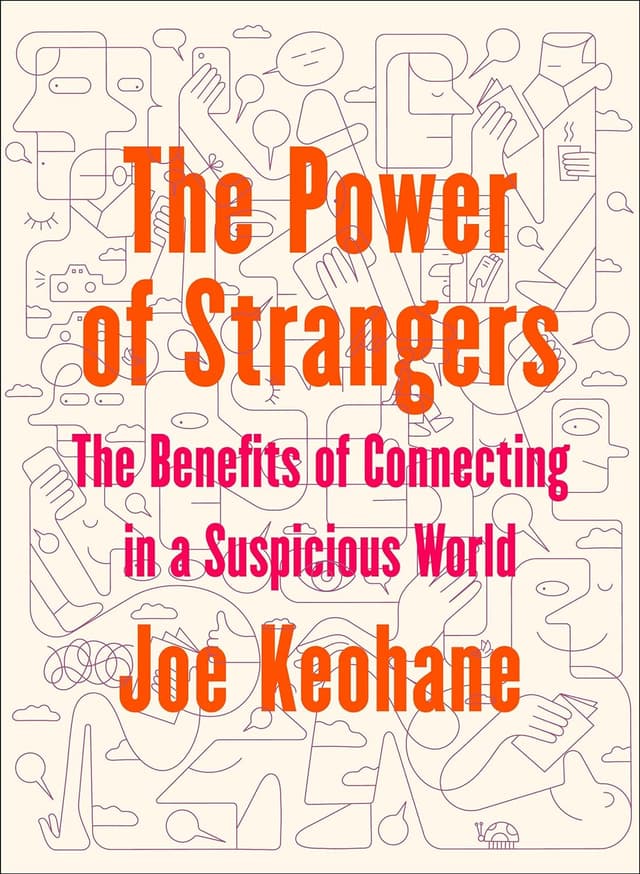Steph Balzer | June 11, 2024
The Stranger Edition
On the power of (very) short-term intimacy.
Recommended Products

An exploration of the benefits of interacting with strangers, revealing how 'minimal social interactions' can offer a substantial sense of belonging and happiness.
Steph Balzer (SB) publishes Cento and is co-founder of Second Act, a community for mid-career professionals who are pivoting to careers they love. She's written a few WITI editions, including The Emotional Language Edition and The Organizing Edition.
Steph here. Fresh out of college, armed with a degree in English, I landed a temp job as a receptionist at a business newspaper in Phoenix. This seemed as good a gig as any from which to scout the landscape of local ad agencies in search of “real” work.
Who could have predicted that “receptionist” would turn out to be one of my most satisfying jobs ever? I loved answering phones, if I’m being honest. Daily, I would feel a frisson of happiness from the simple act of being kind and serviceable to strangers. I felt those similar, tingly sensations again when I worked as a shop girl while in graduate school in Tucson. But as neither of these roles were ambitious careers, I’ve always tended to overlook what made them great.
In the past, writing and creating would have always been the work I told you I enjoyed most. So it took me a long while, post-pandemic, to identify that something was still missing. It wasn’t necessarily seeing colleagues in real life, or attending in-person meetings, and it wasn’t the proverbial water cooler talk, either.
What I missed was casual interactions with strangers.
Why is this interesting?
Little did I know, there’s research about the value of talking to strangers, despite that we board flights hoping our seatmate isn’t a chatterer, or that we stand silently amidst the gaggle of professionals on city street corners, waiting to cross, each of us lost in private worlds piped in through noise-canceling airpods.
An excerpt from Joe Keohane’s book, The Power of Strangers: The Benefits of Connecting in a Suspicious World, reveals how what psychologists call “minimal social interactions” can provide us with an outsized sense of belonging and happiness:
A hefty body of research has found that an overwhelmingly strong predictor of happiness and well-being is the quality of a person’s social relationships. But most of those studies have looked at only close ties: family, friends, co-workers. In the past decade and a half, professors have begun to wonder if interacting with strangers could be good for us too: not as a replacement for close relationships, but as a complement to them. The results of that research have been striking. Again and again, studies have shown that talking with strangers can make us happier, more connected to our communities, mentally sharper, healthier, less lonely, and more trustful and optimistic.
If talking to strangers is so satisfying, why don’t we do it more? From my own perspective, I didn’t understand its value. I interpreted my feelings of longing to indicate some kind of failure, as if my intimate and long-standing relationships weren't enough.
Keohane cites a number of reasons why, including that we have low expectations of conversations with strangers, we don’t anticipate being liked ourselves, and we’ve been culturally conditioned to fear the unknown. Also, there’s the social norm that talking to them is just not done.
Recently, I picked up some part-time work in community organizing, in which talking to strangers is a necessity. I didn’t expect this to be a real-time field test of these ideas, rather, I was following my intuition and conviction to contribute in a new and relevant way. And yet, the results have been mind blowing. Turns out that talking to strangers—having conversations that are real, intimate, and ephemeral—was exactly what I needed.
This discovery has allowed me to reframe my past interactions with strangers, too. During the several months I worked as a receptionist, for example, my car broke down, and I rode the city bus to the office while saving money to repair it. I sat next to a high school kid a few times during the morning commute, and we struck up a conversation. He told me some harrowing details about his mother’s cancer, about school, about his depression. On my last day as a bus rider, I asked if I could tell his school counselor to check in on him. He said okay.
I also felt that story was missing an ending, but now I understand it to be complete. What happened to that kid? I’ll never know. We began as strangers, and we returned to that. (SB)
–
Thanks for reading,
Noah (NRB) & Colin (CJN) & Steph Balzer (SB)
